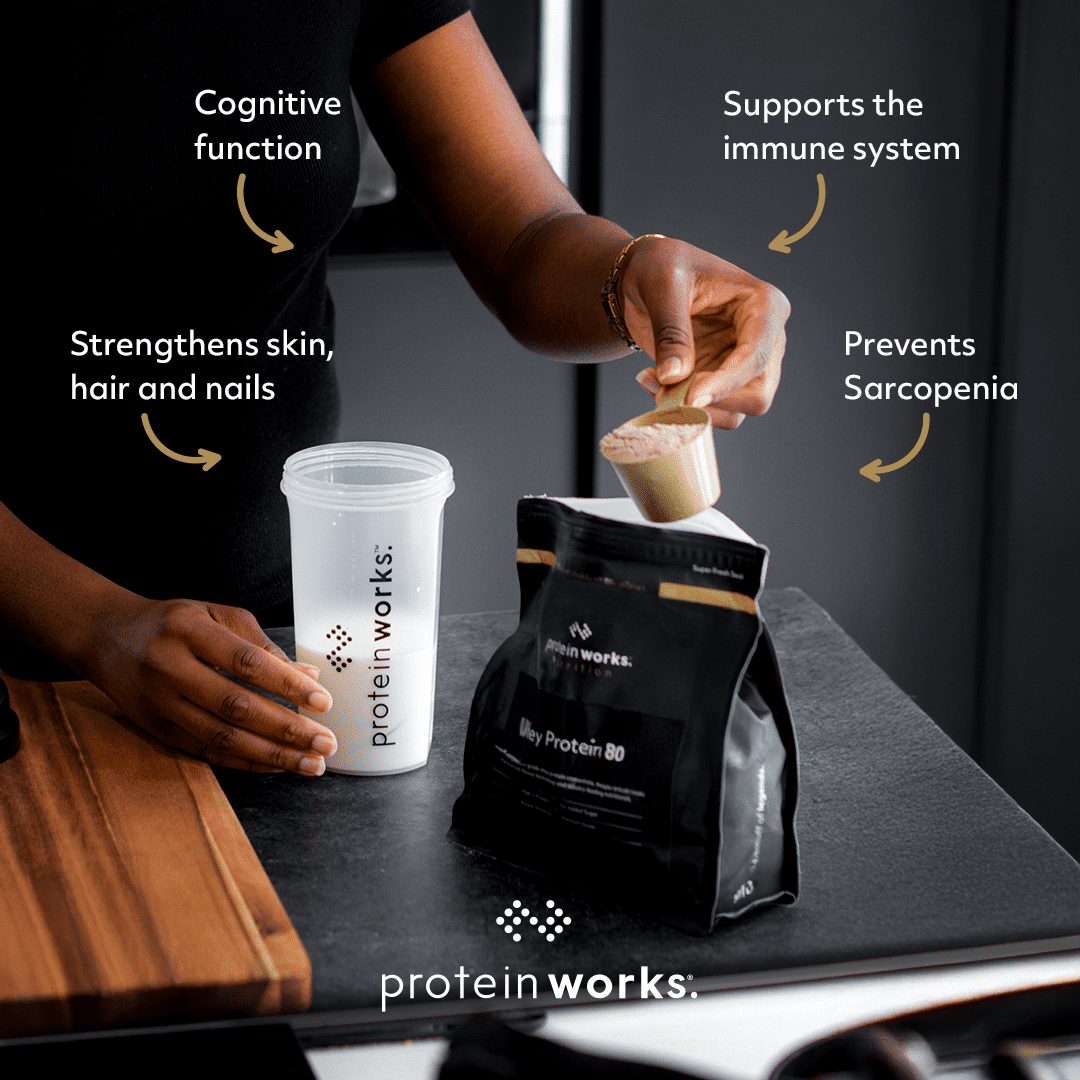
What are the Benefits of Protein?
Historically, protein has been viewed purely as a tool for muscle building. And yes, whilst protein is essential for muscle health, the role of this macronutrient goes far beyond the gym floor.
Whilst not an exhaustive list, protein has been shown to support:
- Immunity
- Metabolism & Weight Management
- Cognitive function
- Skin, Hair & Nails
- Bone
- Sarcopenia prevention
Let’s dive into the evidence for each…
 Protein and the Immune System
Protein and the Immune System
Your immune system is a complex network of cells and systems. All working together to protect you from harmful invaders like bacteria, viruses, and other pathogens. Protein plays a central role in this defence system in two main ways:
Building blocks: Antibodies (the body’s first line of defence against infections) and Immune cells (like T-cells, B-cells, and natural killer cells) are made from proteins. This means that your body needs a consistent supply of amino acids to maintain a robust immune response (1, 2).
Recovery: Protein supports the repair and regeneration of tissues that have been damaged from events such as injuries, infections, or surgeries, helping your body to recover more efficiently (3).
Takeaway: A diet rich in protein supports immune response and may reduce the severity and duration of illnesses.
Protein and Metabolism
Thermic effect of food: Protein has a high thermic effect, meaning your body burns calories digesting and metabolising it. Accordingly, this can aid in weight management by boosting overall calorie expenditure (4,5).
Blood sugar regulation: When protein is consumed alongside a carbohydrate source, it helps slow the absorption of glucose from the carbohydrates into the bloodstream, helping to stabilise blood sugar levels (6). This may benefit individuals living with diabetes or insulin resistance (such as those with Polycystic Ovarian Syndrome) (7,8). As a bonus, stabilising blood glucose can also support weight management via helping manage cravings and hunger (9).
Takeaway: Incorporating adequate protein into your meals may help regulate metabolism, blood glucose, and control appetite. This helps to support both weight and diabetes management.
Protein and Cognitive Function
While carbohydrates are the brain’s preferred and primary fuel, protein too may play a crucial role in cognitive function. A recent study published in The American Journal of Clinical Nutrition found when 5% of calories from carbohydrates were swapped for animal protein, participant’s risk of dementia decreased by 11%. Interestingly, when swapped for plant-protein, this risk decreased by 26% (10).
Takeaway: A balanced diet that includes adequate protein—especially plant-based sources—may reduce the risk of dementia.
Protein and Skin, Hair, and Nails
Building blocks: Skin, hair and nails are composed of proteins including collagen and keratin. Collagen is a bit like scaffolding, providing structure to our skin which helps maintain elasticity, firmness and hydration. Keratin is the main structural component of hair and nails, preventing breakage and promoting healthy growth.
Because our bodies make collagen and keratin from protein in the diet (11), if your protein intake is low, hair and nails may grow slower, become more brittle and thin, and skin may appear duller and drier. And whilst most people in western countries meet or exceed their recommended daily protein requirements (12), it is possible to fall short, especially if an individual has increased needs.
The power of plants: If you’re vegetarian or vegan, you’ll be pleased to know that many plant-based protein sources like legumes, beans, lentils, tofu, tempeh, quinoa, nuts and seeds also happen to be rich in hydroxyproline, proline, and glycine – the main amino acids that make up collagen (13) (14). Increasing intake of plants, however, is an endeavor worthy of consideration for any individual regardless of dietary pattern. This is because a range of nutrients including Vitamin A & C, Biotin, and Zinc are also needed in addition to protein to support collagen and keratin production, and overall skin health. One review states ‘fruit and vegetable consumption may represent the most healthy and safe method in order to maintain a balanced diet and youthful appearing skin’ (15).
Takeaway: A diet rich in both protein and plants can support healthy and strong, skin, hair, and nails.
Protein and Bone Health
When we think of bone health, calcium and Vitamin D are often the first nutrients to come to mind. However, protein is equally as crucial.
Collagen production: Protein is necessary for the production of collagen. In addition to skin health, collagen also provides strength and flexibility to bones, joints, and connective tissues (16).
Bone density: Protein makes up 50% of bone (17) and has also been evidenced to play a role in promoting calcium absorption in bone (18), highlighting both a direct and indirect effect of protein on bone density and health.
How much protein is needed to support bone health? International organisations and findings from randomised controlled trials and meta-analyses encourage the consideration of slightly higher intakes than the current UK protein recommendations (0.75g of protein per kilogram of body weight per day (g/kg/d)) on an individual basis. For healthy adults over 65 years old, a proposed recommendation is 1-1.2g protein/kg/d (19, 20, 21, 22).
Takeaway: Don’t overlook protein when it comes to bone health—it’s just as important as calcium and vitamin D.
Protein and Sarcopenia
Sarcopenia is the age-related loss of muscle mass, strength and function. To prevent this requires the rate of muscle protein synthesis to exceed that of muscle protein breakdown. The two most important strategies to achieving this is resistance training and consuming adequate protein (1-1.5g/kg/d protein is suggested for sarcopenia prevention) (23, 24).
Some studies suggest that opting for proteins containing leucine, and evenly distributing protein consumption over the course of a day may also be beneficial to preventing Sarcopenia, due to both playing a role in stimulating muscle protein synthesis (25). However, more research is needed to confirm this.
Final Thoughts
Protein is far more than just a muscle-building macronutrient. From supporting your immune system, metabolism, and nail, skin and hair growth, to preventing cognitive decline, sarcopenia, and loss of bone mass, protein is essential to living a long, rich, and healthy life.


 Protein and the Immune System
Protein and the Immune System


